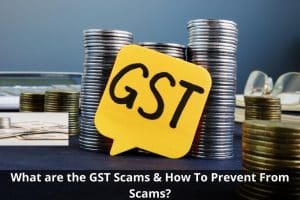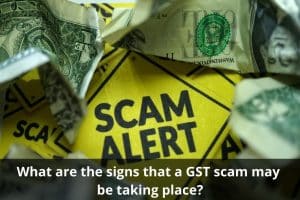What Are The GST Scams & How Do You Prevent Scams?

GST fraud stands for Goods and Services Tax. In India, it is an indirect tax that is levied at each stage of goods and services sold in India.
GST applies to a wide range of products and services starting from selling food items to buying a computer online. It will replace almost all current Central Excise duty (CED) and State Sales Tax (SST).
A seller pays the GST on the cost price of the goods/services he sells. There is no input tax credit. A buyer who purchases the goods/services is liable to make payment of GST.
All taxes collected under GST need to be deposited in the Government’s account. If any person fails to pay GST due, then a penalty is imposed.
To know the GST Scams, here we have listed the Top 10 GST Scams:
1. Input Credit
If you purchase goods/services and later sell those goods/services, then sometimes the vendor forgets to mention the input credit.
However, if you buy something and immediately resell it, then the tax liability shifts to you, and you need to prove that you purchased the item below the minimum threshold limit.
To claim input credit, you need to provide valid sales documents proving where you bought the original well. After knowing the output amount, if you have input credit, then you will get a 100% refund. In case you don’t have the documents, you need to pay full tax.
2. GSTR-1 Returns
Most businesses file their returns either quarterly or annually depending upon their turnover.
You need to submit a return showing the value of your business transactions and all its expenses incurred in the previous quarter or year. Usually, small businesses file GSTR-1 in January, April, July, and October following the financial year-end.
3. Fake Invoice & Purchase Order
Sometimes sellers send fake invoices. These invoices look genuine and are sent via email. When buyers receive these invoices they think that they won’t face any problems and they finalise the deal. Later, they realise that they have been scammed by the seller and decide to demand refunds.
4. Counterfeit Products/Goods
Counterfeit products are not safe to use. Before purchasing goods or using anything, always check whether it’s authentic or counterfeit.
Check the serial number, expiry date, manufacturing date, etc., if it doesn’t match, then it might be a fake. Always ask the seller about the authenticity of goods before making payments.
5. Cash Sale
Cash sale means that you purchase goods with cash instead of taking a bank loan or credit card. If the seller does not make a loan or credit card, then there is no GST. GST does not apply to cash sales. So, GST will not be levied on the transaction.
6. GST Exempted Service
Certain services are GST exempted. The list of GST-exempted services is given below:
– Renting of immovable property
– Transport of goods by rail, road, or inland waterways
– Services by the Reserve Bank of India
7. Deemed Export
Deemed export means that the buyer pays for the goods/services but does not receive them immediately. The buyer receives the goods/services after a specified period. In this case, GST is not levied on the transaction as it is considered an export.
8. Cheque Bouncing
Cheque bouncing is a criminal offence. If you make a GST payment by cheque and the cheque bounces, then you will be liable to pay GST plus a penalty. The amount of GST plus penalty will be twice the GST amount.
9. Online GST Registration
You can register for GST online. The registration process is simple and quick. All you need to do is fill in the details and submit the application. However, some fake websites offer GST registration services.
These websites take your personal and financial information and later use it for identity theft or fraud. So, always check the website before providing any information.
10. Refund Fraud
Refund fraud means that you claim a GST refund even though you are not eligible for it. GST refund can be claimed only if you have input tax credit or if you are exporting goods/services. If you claim a GST refund without any of these, then it is considered refund fraud.
Refund fraud is a criminal offence and you will be liable to pay GST plus a penalty. The amount of GST plus penalty will be twice the GST amount.
These are some of the GST scams of which you should be aware. Always take precautions while dealing with GST. If you are not sure about something, then seek professional help.
What are the signs that a GST scam may be taking place?
Some of the signs that a GST scam may be taking place include:
– Receiving unsolicited calls or emails about GST refunds
– Being asked to provide personal information to receive a GST refund
– Being offered a GST refund in exchange for payment upfront
If you believe you may be the victim of a GST scam, you should contact the Australian Taxation Office (ATO) or the police immediately. You should also report the scam to the ACCC’s Scamwatch website.
Key tips to protect yourself from GST scams
- Be wary of unexpected or unsolicited requests for your personal or financial information, particularly if they come from overseas.
- Do not click on links or open attachments in emails from unknown senders. These may contain malicious software that can steal your personal information.
- If you receive a phone call from someone claiming to be from the ATO, do not give them any personal information. Hang up and call the ATO on their published number to check if the call is legitimate.
- Keep your personal and financial information secure and up to date. This includes ensuring that your tax agent has your most recent contact details.
- Be alert to changes in your circumstances that might make you a target for GST scams, such as the recent lodgment of a tax return or application for an ABN.
Some of the ways businesses can protect themselves from GST scams
- Checking that GST refunds are legitimate before paying them out
- Ensuring that BAS statements are correct and complete
- Checking that ABN applications are genuine
- Reporting any suspicious activity to the authorities.
Individuals can also protect themselves from GST scams by being aware of the signs of fraud, and by taking steps to protect their personal information.
Tax fraud is a serious issue that can have costly consequences for those who fall victim to it. By being aware of the risks and taking steps to protect yourself, you can help avoid becoming a victim of GST fraud. If you think you may have been the target of GST fraud, contact the ATO immediately.

